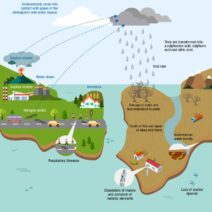As the world grapples with the profound ramifications of climate change, the imperative for innovative technologies becomes more pressing than ever. Electrical engineering stands at the forefront of this transformative endeavor, offering myriad solutions that promise to mitigate the adverse effects of global warming. This discourse delves into the pivotal role of electrical engineering in shaping a sustainable future, examining its contributions to energy efficiency, renewable energy integration, smart grids, and more.
In an age characterized by rapidly depleting fossil fuel reserves, the energy sector is undergoing a renaissance driven by the quest for cleaner alternatives. Electrical engineers are harnessing their expertise to develop groundbreaking technologies that not only reduce greenhouse gas emissions but also enhance energy efficiency. One formidable avenue is the advancement of energy storage systems, such as batteries and supercapacitors. These devices can store excess energy produced by renewable sources like solar and wind, ensuring a consistent energy supply even when conditions are less favorable.
The electrifying potential of solar energy exemplifies this synergy between engineering and environmental stewardship. Photovoltaic technology has evolved significantly, with electrical engineers optimizing solar cells for higher efficiency and lower production costs. In conjunction with advancements in energy storage solutions, solar panels can now provide a reliable power source that is scalable to meet diverse energy demands, from residential rooftops to sprawling solar farms.
Moreover, the confluence of electrical engineering and artificial intelligence is paving the way for sophisticated energy management systems. These systems can analyze consumption patterns and adjust energy distribution accordingly, thereby minimizing waste. By deploying algorithms capable of predicting peak usage times, engineers can facilitate the efficient allocation of resources, reducing reliance on fossil fuels and ultimately lessening the carbon footprint associated with energy consumption.
Transitioning to renewable energy sources raises the need for advancements in grid technology. The advent of smart grids signifies a monumental shift in how electricity is generated, distributed, and consumed. These intelligent infrastructures enable two-way communication between utilities and consumers, facilitating real-time adjustments. Electrical engineers play a vital role in designing and implementing these systems, which can seamlessly integrate distributed energy resources like solar panels and wind turbines, thus enhancing the resilience and reliability of electrical networks.
One critical component of modern electrical engineering is the development of sustainable transportation systems. The transportation sector is a significant contributor to global emissions, and addressing this challenge is paramount. Electrical engineers are spearheading the electrification of transportation through the design of electric vehicles (EVs) and the infrastructure necessary to support them, such as charging stations. Furthermore, innovations in battery technology aim to extend the range of EVs while simultaneously decreasing charging times, thereby making them more attractive to consumers.
Public transportation, too, is undergoing a transformation under the stewardship of electrical engineering. With the introduction of electric buses and trams, cities can reduce their carbon emissions and improve air quality. Engineers are not only tasked with designing these vehicles but also with creating the grid connections and technologies that ensure their operational efficiency. This holistic approach underscores the interconnectivity of various disciplines within electrical engineering and their collective impact on climate action.
Beyond transportation, electrical engineering extends its influence to energy-efficient buildings. The integration of smart building technologies, which utilize sensors and automation, allows for optimized energy usage. Electrical engineers work collaboratively with architects and urban planners to create structures that minimize energy consumption while maximizing occupant comfort. This paradigm shift towards energy-efficient design represents a commitment to sustainability in urban development.
Furthermore, the exploration of smart materials holds the promise of revolutionizing construction practices. These materials can adapt to environmental changes, enhancing insulation and energy efficiency. By leveraging cutting-edge research, electrical engineers can facilitate the implementation of these materials, underscoring their critical role in addressing climate change at a foundational level.
The symbiotic relationship between electrical engineering and sustainability is not confined to energy systems alone. It culprits other sectors, including agriculture and water management. Precision agriculture, enabled by smart sensors and IoT (Internet of Things) devices, allows for optimized resource usage, reducing waste and minimizing environmental impact. Engineers develop the technologies that enable farmers to monitor soil conditions, weather patterns, and crop health, thus promoting sustainable practices and enhancing food security.
Water management is another domain where electrical engineering plays a crucial role. Innovative solutions in water treatment and distribution systems are vital for ensuring access to clean water in the face of climate change. Engineers are developing smart water management systems that utilize real-time data to improve delivery efficiency and detect leaks, thereby conserving precious resources.
In conclusion, electrical engineering embodies a multitude of promises in addressing the existential threat of climate change. By innovating energy-efficient technologies, facilitating the integration of renewable energy, and optimizing systems across various sectors, engineers are champions of a sustainable future. As humanity stands at a crossroads, the shift in perspective toward embracing electrical engineering as a cornerstone of climate action is not merely beneficial but essential. The ingenuity and creativity rooted in this field hold the key to generating sustainable solutions that will empower future generations, ensuring a livable planet amid a warming world.








